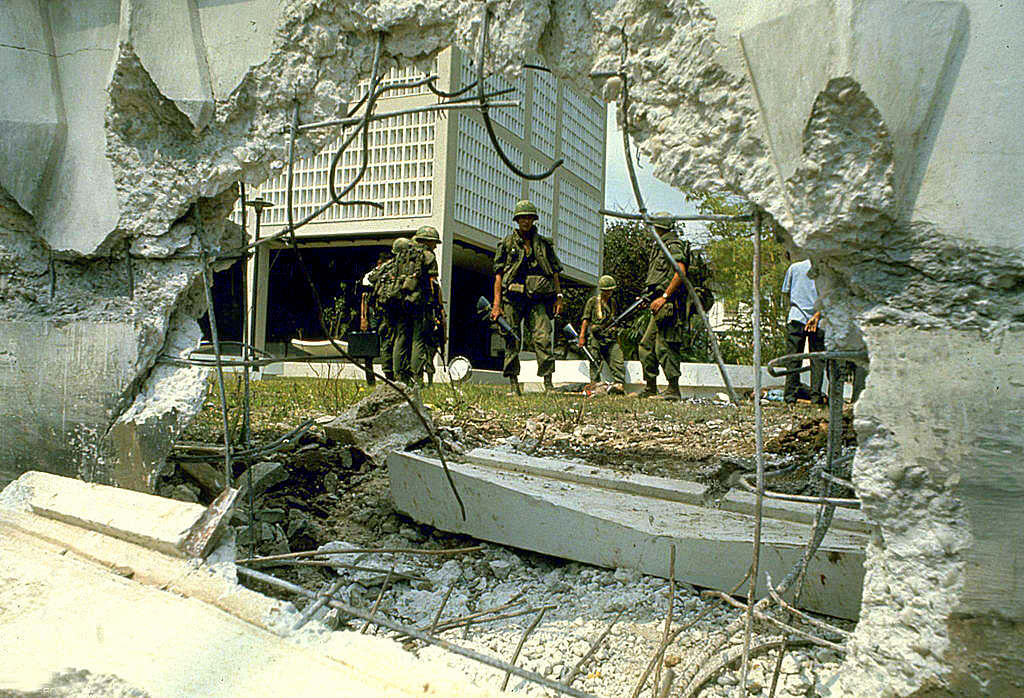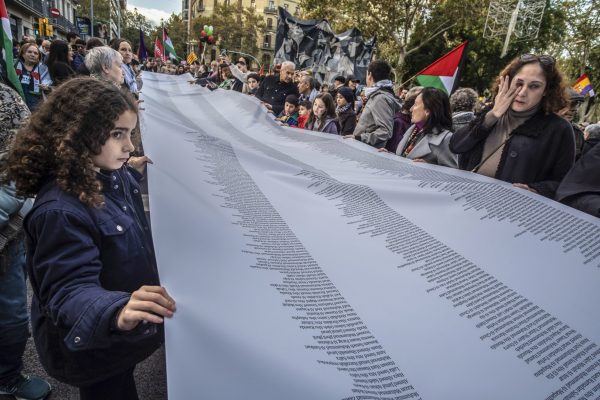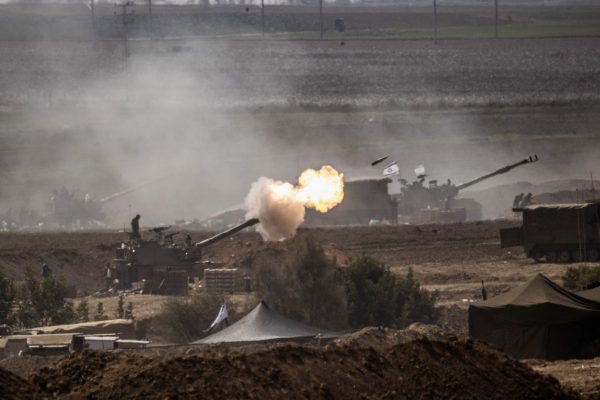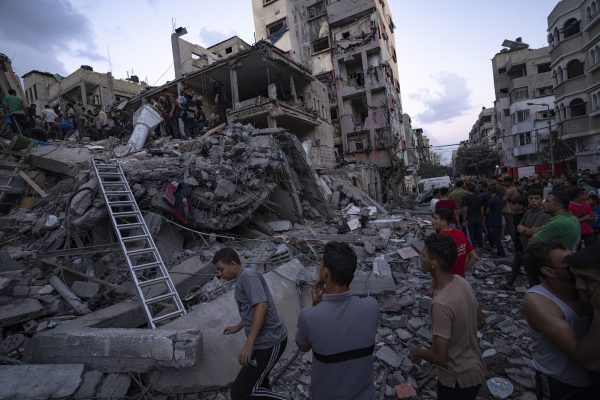This essay appears in print in Fifty Years Since MLK.
Exactly a year before he was murdered, Martin Luther King, Jr., gave one of the greatest speeches of his life, a piercing critique of the war in Vietnam. Two thousand people jammed into New York’s Riverside Church on April 4, 1967, to hear King shred the historical, political, and moral claims that U.S. leaders had invoked since the end of World War II to justify their counterrevolutionary foreign policy. The United States had not supported Vietnamese independence and democracy, King argued, but had repeatedly opposed it; the United States had not defended the people of South Vietnam from external communist aggression, but was itself the foreign aggressor—burning and bombing villages, forcing peasants off their ancestral land, and killing, by then, as many as one million Vietnamese. “We are on the side of the wealthy, and the secure,” King said, “while we create a hell for the poor.”
Cleaving off King’s critique of the Vietnam War was the price of his admission into the U.S. pantheon of heroes.
The war was an “enemy of the poor” at home as well. Not only were poor black and white boys sent “to kill and die together for a nation that has been unable to seat them together in the same schools,” but the vast expense required to obliterate an impoverished, nonwhite nation 8,000 miles away eviscerated the domestic social programs that had promised to narrow economic and racial inequalities at home. The military draft, for instance, offered deferments and exemptions that favored the privileged while programs such as Project 100,000 enlisted men from “the subterranean poor”—men so badly educated they would once have been rejected for military service. Project 100,000 was touted as a program of social uplift, but in reality, it sent poor men to the front lines as cannon fodder, further proving King’s point that the promises of the Great Society were “shot down on the battlefield of Vietnam.”
The Riverside Church speech alone should place King in the pantheon of 1960s antiwar activists. Yet in public memory, his opposition to the Vietnam War is largely forgotten. Why? Part of the answer goes back to the media’s vitriolic denunciation of the 1967 speech. In a characteristic condemnation, Life insisted that King had gone “beyond his personal right to dissent” by advocating “abject surrender” in a “slander that sounded like a script for Radio Hanoi.” Many commentators said King should stick to domestic civil rights and let his criticism of U.S. policy stop at the water’s edge.
King did not back down. Later that month, he renewed his attacks on the war. “Oh, the press was so noble in its applause . . . when I was saying, ‘Be non-violent toward Bull Connor,’” referring to the commissioner of public safety in Birmingham, Alabama, who turned fire hoses and attack dogs on peaceful civil rights demonstrators. But that same press, King continued, “will curse you and damn you when you say, ‘Be non-violent toward the little brown Vietnamese children.’”
Fifty years later, we are still plagued by the racial hypocrisy and violence that King denounced. Powerful people and institutions still tolerate and promote racism at home while waging war against nonwhites abroad. Think only of the many police officers who have been acquitted of murdering unarmed African Americans such as Eric Garner and Michael Brown, or of President Donald Trump’s insistence that the white supremacists who attacked peaceful counter-protesters in Charlottesville, Virginia, included “some very fine people.” Abroad, the Trump administration continues to “bomb the shit out of” foreign targets not just in Afghanistan, Iraq, and Syria, but in Yemen (in league with Saudi Arabia) and in Somalia. Indeed, the U.S. imperial footprint and assertion of military power is nowhere in decline. Since 2013, according to journalist Nick Turse, the United States has conducted military operations in at least 130 countries every year, roughly 70 percent of the nations on Earth.
Our genuflection to military service goes hand in hand with our failure to treat antiwar protestors as the real heroes of U.S. democracy.
Recent state-sanctioned violence has not gone uncontested. At home there are movements such as Black Lives Matter, and in foreign policy, polls show that since 2006 a majority of Americans have opposed the endless wars in Afghanistan and Iraq. But despite broad antiwar opinion, we do not have a broad and vibrant antiwar culture or movement. That is one of the most striking differences between our own time and the Vietnam era.
The Vietnam War, as I have argued in American Reckoning: The Vietnam War and Our National Identity (2015), undermined public faith in U.S. exceptionalism like no other event in our history. Never before had such a wide range of citizens, cutting across lines of class, race, gender, and religion, rejected the claim that the United States was a unique and invincible force for good. As King made clear, the Vietnam War blatantly contradicted every assumption of moral superiority, and even pro-war hawks were left to wonder how the greatest military power in world history had been unable to prevail against a nation of rice farmers.
To understand our current political moment, we must understand how political and media forces, especially on the right, responded to this embarrassment and to criticisms such as King’s. Conservatives at the time were determined to rebuild everything they thought the war had destroyed—U.S. power, pride, prestige, and patriotism. Above all, they sought to resuscitate a faith in U.S. exceptionalism. That restoration project was surprisingly successful, but it produced a new, makeshift form of U.S. exceptionalism that is different from its original model. In place of the universalistic, idealistic, intrinsically confident faith in national superiority of the 1950s, the post-Vietnam version of exceptionalism is ever more nationalistic, defensive, bombastic, and xenophobic. Both versions are dangerously imperialistic and aggressive, but our latest model is more explicitly founded on a demonization of foreign—primarily nonwhite—others.
Perhaps the most characteristic feature of the new U.S. exceptionalism is the belief that the world’s greatest nation is not the envy of the world, not a shining city on a hill, but the victim of outrageous and inexplicable attacks from nonwhite countries and cultures. Whether the attacks are real (such as 9/11) or imagined (such as Iraq’s weapons of mass destruction), they are almost always attributed to “rogue” nations, terrorist groups, religious extremists, or nonwhite immigrants whose actions are represented as barbaric hate crimes with no plausible historical motive or U.S. provocation.
The new exceptionalism is born of the vilification of the antiwar movement and the veneration of U.S. troops as heroic victims.
The new U.S. exceptionalism has many sources but two important ones were born from the bitter memory of failure and defeat in Vietnam: the effective campaigns to vilify the antiwar movement and to instill deference to the military by constructing an image of U.S. troops and veterans as icons of heroic victimhood. These two efforts were mutually reinforcing. Antiwar activists since the Vietnam War have been cast as cowardly draft-dodgers who scorned and betrayed their patriotic peers who served in Vietnam.
Indeed, King is not included in the pantheon of antiwar activists precisely because, in U.S. public life and memory, there is no peace pantheon to join. We have no national sites and stories that commemorate the 1960s antiwar movement—no museums, memorials, parks, highways, or holidays. Nowhere can you find a major public celebration of the most diverse and dynamic antiwar movement in U.S. history.
Perhaps you expected to find it, at long last, in the ten-part, eighteen-hour PBS documentary The Vietnam War, by Ken Burns and Lynn Novick. If so, you were disappointed. The 30 million dollar film, released in 2017, features some flattering profiles of Vietnam veterans who joined the antiwar movement, but peace activists who lack a military credential are virtually invisible. The two civilian antiwar activists who do appear (out of eighty interviews) criticize the peace movement more than the war. One of them tearfully apologizes for calling veterans “baby-killers and worse.” The film thus reinforces a longstanding myth that the ill-treatment of veterans (for which the government and corporations warrant most of the blame) was perpetrated primarily by the very movement that worked to bring them home.
With veterans so firmly cast as victims of peaceniks in our national consciousness, the next logical step was to offer them automatic hero status. Since 9/11, the ritualized support for troops and veterans, far more symbolic than substantive, has become obsessive. We are encouraged to express our gratitude through yellow ribbons and the mantra of “Thank you for your service,” but such demonstrations serve to inhibit national debate about why our government continues to order troops to fight unpopular wars that don’t enhance the safety or freedom of anyone.
From the nineteenth century to the present, there is a strong correlation between surges in Ku Klux Klan membership and an influx of veterans returning from war.
Moreover, our ritual deference to the military also prevents the common understanding of a basic truth: no large group is heroic by definition. War breeds violence and brutalization, and it is therefore remarkable that the majority of veterans re-enter civilian life peacefully. But not all do. As Kathleen Belew documents in her forthcoming book, Bring the War Home: The White Power Movement and Paramilitary America, veterans from Vietnam and every war since have played a significant role in the growth of white supremacist groups. In fact, there is a strong correlation between surges in Ku Klux Klan membership (going all the way back to the 1860s) and an influx of of veterans returning from war.
Perhaps it shouldn’t be surprising, however, that some Vietnam veterans have found common cause with white supremacists. White supremacists, after all, ascribe to a certain victim status that resonates with the narrative of nationalist victimhood that originated during the Vietnam War itself. By 1972 President Richard Nixon often spoke as if the only reason to continue fighting in Vietnam was to get back our prisoners of war. Never mind that belligerents routinely detain POWs until the war’s end; Nixon accused Hanoi of making “barbaric use of our prisoners as negotiating pawns.” Nixon’s charge set the stage for the greatest of post-Vietnam myths: that the victorious communists of Vietnam continued to hold an unknown number U.S. POWs long after the end of the war.
Hollywood films fueled this fire, perfectly reflecting the culture of xenophobic victimhood. In films such as Uncommon Valor (1983), Missing in Action (1984), and Rambo: First Blood Part II (1985), veterans return to Vietnam to rescue emaciated white comrades, slaughtering hundreds of savage Asians in the process. These fantasies of revenge and national redemption did not depend on evidence or logic. The fact that Vietnam always denied holding postwar POWs and had no apparent motive to do so was taken as further evidence of the former enemy’s perfidy. By the early 1990s, roughly two-thirds of Americans believed the charge despite two congressional investigations that failed to discover any persuasive evidence.
Of course, not all foreign assaults were imaginary. The Iran hostage crisis of 1979–81 generated the first major manifestation of national victimhood. While fifty-two U.S. diplomats, marine guards, and CIA agents were held captive, media coverage made it seem as if the entire nation was under assault. Indeed, the ABC show that became Nightline was first called America Held Hostage. Little effort was made to explain the deep roots of Iranian opposition to U.S. foreign policy that began with the 1953 CIA-orchestrated overthrow of the popular Iranian prime minister Mohammad Mossadegh, and was followed by twenty-six years of support for the brutally repressive Shah of Iran. The hostage-taking was blowback against a long history of U.S. policy, not an inexplicable act of indiscriminate evil.
The ghost of defeat in Vietnam continues to haunt the stewards of U.S. empire as it lurches further into its decline. As Trump lamented, “We don’t have victories anymore.”
As the days of captivity ticked by, obsessively counted by the media, President Jimmy Carter launched a rescue operation that had to be aborted when three helicopters malfunctioned in the desert south of Tehran, leaving behind eight dead U.S. crewmen. The failed rescue—“the debacle in the desert,” Time dubbed it—punctuated a key, if unintended, ingredient of victim culture: a sense of helplessness to achieve complete and unambiguous retribution against the nation’s tormentors.
The ghost of defeat in Vietnam continues to haunt the stewards of U.S. empire as it lurches further into its decline. Over the past fifty years, no “victory” has been perceived as permanent or significant enough. At the end of the 1991 Persian Gulf War, when President George W. H. Bush claimed that “the specter of Vietnam has been buried forever in the desert sands of the Arabian Peninsula,” he did not realize how short-lived that victory would be. Indeed, as Trump lamented when announcing his candidacy for president, “We don’t have victories anymore.”
In its heyday, U.S. exceptionalism relied on the “absolute victory” and “inevitable triumph” promised by President Franklin Roosevelt on the day after Pearl Harbor in 1941. It underwrote President John F. Kennedy’s famous vow that the United States “shall pay any price, bear any burden, meet any hardship, support any friend, oppose any foe to assure the survival and the success of liberty.” But, by contrast, the version of exceptionalism cobbled together out of the tatters of the Vietnam era can make no such promises. Nationalism today is founded more on grievance than confidence, more on belligerent victimhood than idealistic messianism.
Nationalism today is founded more on grievance than confidence, more on belligerent victimhood than idealistic messianism.
Since 9/11 and President George W. Bush’s declaration of a Global War on Terror, xenophobic Americanism has come into full flower. As Bush put it ten days after 9/11, “Every nation, in every region, now has a decision to make: either you are with us, or you are with the terrorists.” The “terrorists,” it turned out, were almost always racialized as nonwhite, while white domestic terrorists such as Timothy McVeigh (who killed 168 people in Oklahoma City in 1995) have been cast as criminals or madmen.
By every measure, Bush’s Global War on Terror, as well as its iterations under Barack Obama and Trump, have been colossal failures. And the parallels between U.S. policies in Vietnam and in our twenty-first century wars are staggering. In all three theaters, we have seen undeclared wars waged under false pretexts, and we have deployed hundreds of thousands of U.S. troops to lands where they were widely perceived as hostile invaders. The mission has been to prop up foreign governments that cannot gain the broad support of their own people, and we have fought brutal counterinsurgencies guaranteed to maim, kill, or displace countless civilians. Once again, the fighting has persisted long after a majority of Americans deemed it mistaken or immoral, and once again, the government has failed to achieve its stated objectives.
But for those who preside over the U.S. empire, all that matters is sustaining U.S. power, however illusory or ineffective it may be. Trump is the natural result of the brittle, defensive form of U.S. exceptionalism that originated after Vietnam, and he epitomizes the bellicose nationalism I have been describing. Every day he presents himself as the victim of lies and unjustified attacks. Every day he lashes back with whatever new “reality” he decides to invent. Evidence of success or failure, truth or falsehood, is irrelevant. Each failure is either called a success or used to justify further attacks on perceived enemies at home or abroad. Government policy is now, more than ever, an “enemy of the poor,” and we have not addressed the persistent racial injustices that are, as King made clear, inextricably linked to our foreign policy. Trump represents, in absurd extremes, the narcissism, self-delusion, and abdication of responsibility that are part of this country’s failure to reckon with the criminality and corrosiveness of its imperial exploits.
Trump is the natural result of the brittle, defensive form of U.S. exceptionalism that originated after Vietnam.
King cautioned against this outcome, and he offered—and through his words, continues to offer—another path forward, one of relentless self-criticism and mature self-interrogation meant to inspire a revolution of values and uproot the machinery of imperialism. The Vietnam War, he warned, was “a symptom of a far deeper malady.” Unless there was a “revolution of values,” the “giant triplets of racism, extreme materialism, and militarism” would continue to betray the nation’s greatest ideals. Meaningful change required not only the end of war in Vietnam, but the replacement of allegiances to “tribe, race, class, and nation” with “loyalty to mankind as a whole.” Without these radical transformations, King concluded, the United States would remain “the greatest purveyor of violence in the world.”
Part of our failure to attend to this dimension of King’s thought is, paradoxically, rooted in his hagiography. Our reflexive genuflection to military service goes hand in hand with our failure to treat antiwar protestors as real heroes of U.S. democracy. King’s antiwar critique unsettles something very insidious and essential to the reproduction of empire. Cleaving it off was the price of admission into the U.S. pantheon of heroes.








